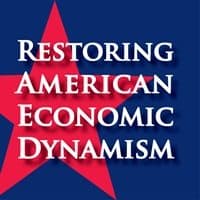Share Event

Restoring American Economic Dynamism: New Solutions for America’s Productivity Slowdown
Full-Day Conference Presented in Partnership with the CFA Institute Research Foundation, the Museum of American Finance and S&P Global
Tuesday, November 28, 2017 | 09:30 AM to 06:00 PM
US productivity growth is at historic lows by most measures. The number of new US companies opening barely outpaces the number of companies closing. Inequality is increasing, as is the mortality of those with only a high school education. The United States risks becoming the new “sick man” of the world, analogous to the rotating position of the Ottoman Empire, Britain, France, Germany and Italy as the sick man of Europe.
“Restoring American Economic Dynamism: New Solutions for America’s Productivity Slowdown” will be a day-long conference offering fresh ideas of how to bring back American prosperity and growth. The conference will address the true economic challenges facing America: Is it a measurement problem, with statistics failing to capture improvement in living standards? Or is it an inequality problem, where the United States actually has two economies, one providing high-wage jobs in information technology and finance, and the other centered on low wage service jobs and dying old industries where most of the supply chain has fled to other countries?
Most analyses of US economic decline are either fatalistic, or wholly lacking in solutions other than generic ones such as “infrastructure” and “education.” In contrast, this conference will expand the policy choice set to include new ideas about how to restore American economic vitality. These include the possibility of new labor market institutions, such as apprenticeship programs or ways of sharing applied research and technology. Ultimately, the US needs an expanded innovation system focused on production. Such novel ideas could result in US workers and firms better participating in manufacturing, innovation and entrepreneurship, leading to more dynamic and inclusive growth.
Location
MUSEUM OF AMERICAN FINANCE
48 Wall Street | New York, NY 10005
Email: events@moaf.org
Fee
Members $40 | Nonmembers $100
Agenda
9:00: Doors open; continental breakfast served
9:30: Welcome and Opening Remarks
David Cowen, MoAF President
David Adler, Conference Organizer
Laurence Siegel, Conference Co-Organizer
Richard Sylla, MoAF Chairman
9:45: Opening Keynote: “The Audacity of Pessimism: Challenges for the World Economy”
Lord Mervyn King, Governor of the Bank of England (2003-2013)
10:30: Break
10:40: Panel: Does the US have a Productivity Problem or a Productivity Measurement Problem?
Productivity Was Already Slowing Before the Financial Crisis
Chad Syverson, J. Baum Harris Professor of Economics, The University of Chicago
Is America Still a Sartup Nation?
Dane Stangler, Director of Policy Innovation, The Progressive Policy Institute (PPI)
Two Economies: the Decline of the American Worker and the Rise of Superstars
Anton Korinek, Johns Hopkins University; former visiting scholar, the World Bank, the IMF and the BIS
Chair: Laurence Siegel (conference co-organizer), Director of Research, CFA Institute Research Foundation
11:45: Break
11:55: Mid-morning Keynote: “Productivity and Growth in the Digital Age”
Jaana Remes, Partner, McKinsey Global Institute
12:30: Buffet lunch served
1:00: Lunchtime Keynote: “Finding Capital in the Stock Market”
David Blitzer, Managing Director and Chairman of the Index Committee, S&P Dow Jones Indices
1:45: “Building a Robust Apprenticeship System in the United States”
Robert Lerman, Fellow, Urban Institute
2:15: Why is Business Investment So Low in the United States?
Thomas Philippon, New York University, winner of the 2013 Bernácer Prize for Best European Economist under 40
2:45: Break
3:00: Solutions Panel
Reversing the Decline in Manufacturing (and why automation isn’t the problem)
Susan Houseman, Vice President and Director of Research, Upjohn Institute for Employment Research
Building Innovative and Fair Supply Chains
Susan Helper, Case Western, Former Chief Economist at the US Department of Commerce and a member of the White House Staff
Innovation: Strategies for Growth in the United States
Dan Breznitz, Professor and Munk Chair of Innovation Studies, University of Toronto; editor of “Third Globalization: Can Wealthy Nations Stay Rich?”
Chair: David Adler (conference organizer), Author of The New Economics of Liquidity and Financial Frictions (CFA Institute Research Foundation); Senior Advisor, XA Investments
4:15: Group Panel: Now What?
4:45: Closing Keynote
Edmund Phelps, Nobel Laureate, Economics; Director of the Center on Capitalism and Society, Columbia University
5:05: Cocktail reception
6:00: Event ends
DISCLAIMER OF ENDORSEMENT
References herein to any specific sponsor or service do not necessarily constitute or imply the endorsement, recommendation or favoring by CFA Society New York. CFA Society New York strives to be a community for diverse opinions and differing perspectives, and the views and opinions expressed by speakers, presenters and/or organizers at events do not necessarily state or reflect those of CFA Society New York.
CFA Society New York expects all attendees to comply with CFA Society New York’s Code of Conduct while attending CFA Society New York events or meetings. CFA Society New York expressly reserves the right, in its sole discretion, to grant or deny access to any individual, or to expel any individual from any CFA Society New York event or meeting.
